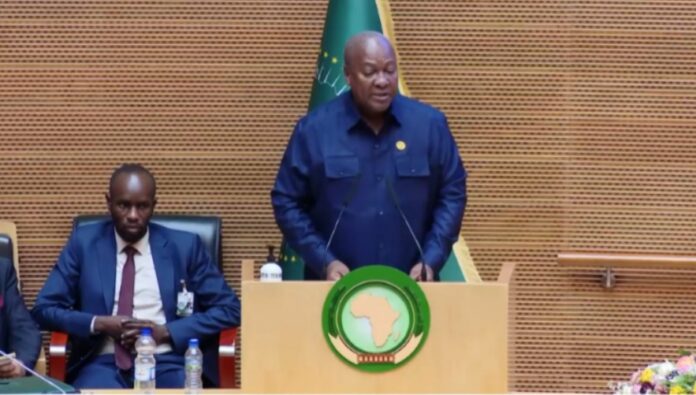President John Dramani Mahama is championing the cause for reparations, calling for collective action to achieve justice for Africans and people of African descent.
Speaking at the 38th AU Summit in Addis Ababa, Ethiopia, he emphasized the need for stronger legal and institutional mechanisms to address historical injustices.
The President highlighted the devastating effects of the transatlantic slave trade, colonialism, apartheid, genocide, and neo-colonial exploitation, which have resulted in economic disparities, social inequality, and racial prejudices.
“We must continue to advocate for stronger legal and institutional mechanisms… to ensure that justice for the historical trauma inflicted on global Africa is not just a conversation, but a reality,” he said.
He noted that the transatlantic slave trade was one of the most heinous crimes against humanity, with over 12.5 million Africans forcibly displaced and an estimated two million perishing during the middle passage.
To achieve justice, Mahama emphasized the need for collaboration among European member states, regional economic communities, the global African diaspora, civil society organizations, academia, the private sector, and international partners.
He expressed Ghana’s support for the initiative, urging collective action towards a fair, just, and equitable future for all Africans and people of African descent.
“We must continue to advocate for stronger legal and institutional mechanisms at the national, regional, and international levels to ensure that justice for the historical trauma inflicted on global Africa is not just a conversation, but a reality,” President Mahama said.
The African Union has dedicated 2025 to addressing these injustices, with the theme “Justice for Africans and People of African Descent through Reparations”.
This initiative aligns with the AU’s vision for an integrated, peaceful, and prosperous continent, as outlined in the AU’s Agenda 2063.
It seeks to mobilise political will, foster partnerships, engage stakeholders, elevate awareness, encourage dialogue, and ensure an end to the culture of silence and denial on racism and colonialism.
ALSO READ:

